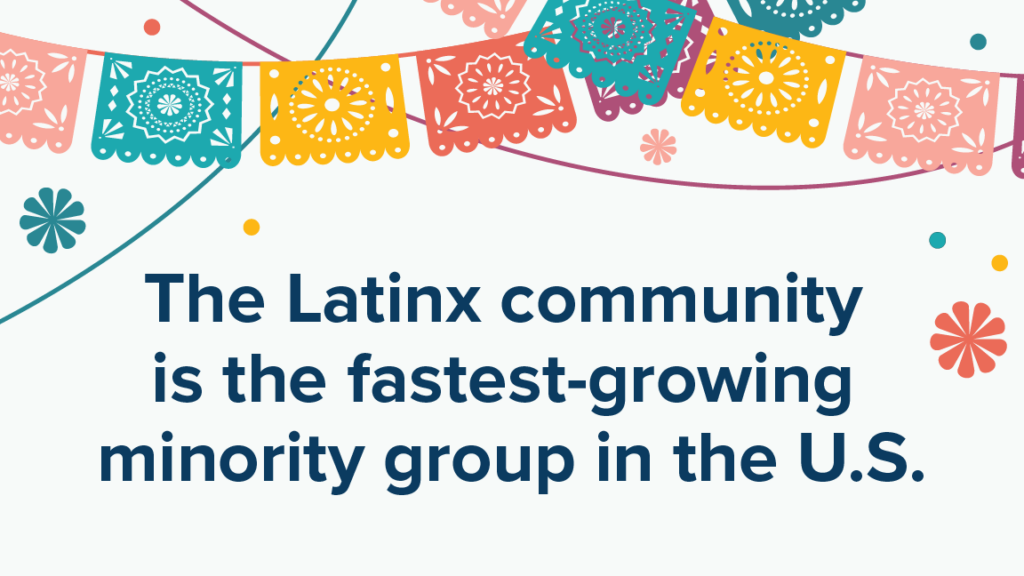Celebrate Latine Heritage Month by Addressing Health Inequities


I am a clinical psychologist by training. In the early years of my career, I had the privilege of working with families in the Latine community in the Los Angeles metropolitan area. Noting the recurrence of troubling issues that I witnessed firsthand, the impacts of health inequities and social determinants on lives were brought into sharp relief for me.
Working with adolescents who were court-mandated to receive therapy, I would bring in the family. I was trained to understand that progress often depended on addressing some of the familial dynamics. What I realized needed changing was much deeper than familial issues. It was access to education, healthcare, and making a livable wage. There were issues of safety. Individual protection, or lack thereof, hinged on participation in gangs. I saw parents working long hours at multiple jobs and young kids have no childcare. Healthy food wasn’t readily available — but processed, nutritionless food could be found readily. Yet my training was no focused, nor was my position, on addressing these systemic issues
I am also a Latine woman. My heritage, work, and experiences reinforce my connection to my community. In part, it was the stark contrast to my upbringing that provided me with a critical lens to see the systemic issues that were affecting these individuals who also identified as Latine and yet whose paths were so different than mine. I realized then that I wanted to focus my impact on addressing systemic issues. To this end, I celebrate Latine Heritage Month by advocating for urgent attention to the health inequities that affect this community.
Despite ongoing efforts to enhance clinical outcomes, health disparities persist for Latine individuals, who:
- Experience higher mortality rates from cervical and breast cancers compared to non-Latine.
- Are less likely to receive regular pap tests and mammograms.
- Exhibit a higher rate of cardiovascular disease, yet are less likely to have their blood pressure or cholesterol regularly checked.
- Are more likely to experience gestational diabetes.
As we conclude Latine Heritage Month, I take a moment as both a clinician and a member of this community to call for change. The healthcare industry must critically examine current policies and care delivery methods.
The History of Hispanic Health Disparities
The Latine community is diverse, comprised of individuals in the U.S. who identify as being of Spanish-speaking origin, descent, or background. It’s inclusive of 20 Latin American nations across Mexico, Central America, South America, Puerto Rico, Cuba, and Spain.
Despite this diversity, there are commonalities in the health disparities faced by this community. According to a recent study by Pew Research, individuals in the Latine community are less likely to have health insurance and less likely to seek preventive care compared to other segments of the American population.
In addition to historical issues related to access, the U.S. has a long history of cultural discrimination against immigrants. Language barriers, cultural obstacles, and heightened levels of poverty are all symptoms of an underlying condition: discrimination. They have contributed to poorer outcomes.
Seared into my memory is a Latine individual who was in tears while sharing with me a scary diagnosis they had just received, yet they couldn’t fully understand the discussion they had with their doctor due to a language barrier. It was further complicated by their worry that they would not be able to pay for the treatment. They also were embarrassed to talk to their family about it and felt isolated while carrying this burden. If we don’t address the many layers of challenges facing individuals in the Latine communities, the health outcomes will not improve.
This Community is Growing
Today, the Latinx community is the fastest-growing minority group in the U.S., comprising 15% of the population and estimated to expand by 115% by 2025. This growth emphasizes the need to address health inequities, not only as a moral imperative but also from a population health perspective where the cost impact could be monumental. It is in our collective interests to enact change now.
How Payers, Partners and Companies Can Usher in Change
To address health inequities for the Latine community and others. I’ve summarized five steps to address systemic issues that we can implement today. Some are simple, some will take more time, and others can be achieved through market partnerships — all are within reach.
1: Breakdown language barriers
Ensure translators are available in health care settings. Time and time again I hear stories, even from my team at Ovia, where miscommunications due to language barriers have caused adverse events or unnecessary care. These issues could have been avoided had a translator with cultural and clinical knowledge been present.
Federal and state laws mandate translators be offered in healthcare settings, however, resources are sometimes stretched too thin and services aren’t available. Health plans and organizations must hold providers accountable for providing care in the individuals’ preferred language. Through advancements in technology, however, there are digital resources that can help with translation on site. Plus, many hospitals and health systems now encourage staff to learn conversational Spanish, and offer classes and stipends to do so.
Additionally, there are personal digital health tools that are offered in many languages, like Ovia. Patients can use these digital health solutions to educate themselves and learn how to advocate for themselves. Should you partner with a digital health solution, ensure it’s available in Spanish or multiple languages.
If your organization provides care or benefits, you can play a role in making sure your content is offered in multiple languages as well.
2: Improve access to nutritious foods for pregnant women and families
Considering data suggesting higher rates of gestational diabetes among Latine women, ensuring access to nutritious foods is crucial. Today, lack of awareness about available programs, physical proximity to a grocery store with healthy options, lack of transportation, and ever-rising food costs create barriers for many to access affordable and healthy foods.
Here, once again, digital health and technology can play a role. We are educating our members about food assistance programs like WIC, working to break the stigma surrounding them, and personally navigating them to these programs. More on our work and the results of this pilot here.
There are also new solutions that can help deliver healthy food to people living in food deserts or lacking the necessary transportation. Services like Walmart+, Amazon Grocery, Stop & Shop and Instacart now accept EBT payments, SNAP and WIC benefits for online shopping and delivery.
3: Expand health care coverage
Policy and political affiliations aside, expanding access to health insurance to more Latine communities would improve preventative care adherence.
Studies indicate Latine people are less likely to have health insurance. In fact, the Latine community has the highest uninsured rate in the nation at 17.7%. The literature also suggests the Latine population is less likely to seek and receive routine care, which can prevent adverse events and conditions. There is a clear correlation between insurance status and well care. Findings illustrate that consistent access to health insurance coverage increases the use of preventative services and the health of a population.
This is especially important for pregnant women. Risk for conditions like gestational diabetes and preeclampsia can be detected early, and when identified, avoided. More on that here.
By advocating for, and expanding, coverage more people could have the access they so desperately need to seek prevention-focused care, mitigate risk, and stay healthy.
4: Encourage racially concordant care
When care is accessible, we should ensure that staff is representative of the population they serve. This enables racially concordant care, where providers innately understand the lived experiences of patients. More on racially concordant care here.
For Latine people, this is vital, and contributes to their overall understanding of and adherence to care plans.
5: Use digital health to close gaps and access in care
Health literacy and the ability to advocate for one’s health are essential. Digital health has been proven to yield improvements to quality, safety and efficiency of patient care, and help resolve barriers to access.
Digital health solutions, like Ovia, can offer health literacy and advocacy guidelines in a member’s native language. They also help members find quality providers, access benefits, and monitor their individual risk for preventative care.
Celebrate Latinx Heritage Month with Lasting Change
The Latine community is a vibrant part of our communities. If your organization wants to celebrate and honor the contributions of those in the Latine community, start by addressing the health inequities they face.
The steps outlined above provide a starting point. I urge every organization to consider what they can do to address these systemic issues. Making these investments acknowledges Latine Heritage Month, and most importantly improves population health, access to quality care, and outcomes for the Latine population. The gift of health and dignity should be afforded to every individual, and their impact cannot be understated.
